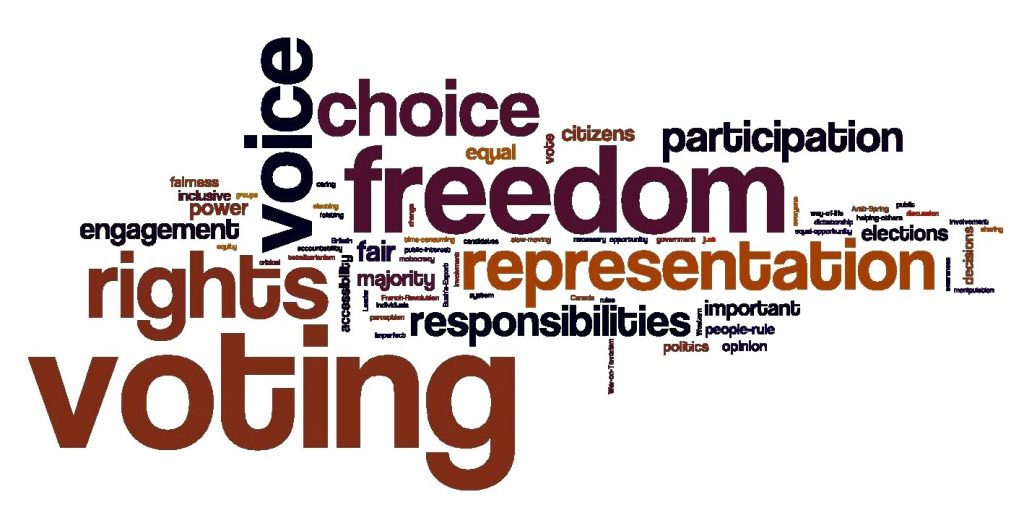Warning: Undefined array key "ssba_bar_buttons" in /usr/home/movgwifi/public_html/yesedinburghwest.info/wp-content/plugins/simple-share-buttons-adder/php/class-buttons.php on line 602
Warning: Undefined array key "ssba_bar_buttons" in /usr/home/movgwifi/public_html/yesedinburghwest.info/wp-content/plugins/simple-share-buttons-adder/php/class-buttons.php on line 602
Warning: Undefined array key "ssba_bar_buttons" in /usr/home/movgwifi/public_html/yesedinburghwest.info/wp-content/plugins/simple-share-buttons-adder/php/class-buttons.php on line 602
 A friend of mine recently ranted that elections and referendums “are undermining democracy” – as instanced by Trump’s victory, the EU referendum in Britain, and the Scottish Independence referendum. Paraphrased, this says “the people didn’t vote the way we think they should have”. This suggests that the people should not undermine the Establishment by having the temerity to vote against them. Yet surely elections and referendums are the very essence of democracy, and if the Establishment is NOT acting in the best interests of the people, then voting against them is their only recourse. The Establishment is not entitled to ignore the people in a democracy.
A friend of mine recently ranted that elections and referendums “are undermining democracy” – as instanced by Trump’s victory, the EU referendum in Britain, and the Scottish Independence referendum. Paraphrased, this says “the people didn’t vote the way we think they should have”. This suggests that the people should not undermine the Establishment by having the temerity to vote against them. Yet surely elections and referendums are the very essence of democracy, and if the Establishment is NOT acting in the best interests of the people, then voting against them is their only recourse. The Establishment is not entitled to ignore the people in a democracy.
This has implications for IndyRef2:
- We must test all policies against the principle “is this in the interests of the Scottish people”?
- We should position ourselves as the party of radical change, not the status quo.
- We are unlikely to convince No voters who benefit from the status quo, to change to Yes.
The Scottish Government are good at number 1, and unlikely to persuade those who are number 3, but there are things that would help emphasise number 2:
- We should commit to change things on independence, not promise to keep things as they are. We should emphasise our values and aspirations for social justice, peace, cooperation, environmental responsibility, and tolerance: for example, by developing a written constitution. We should commit to holding regular referendums immediately after independence to allow the people to decide on membership of the EU, NATO, abolition of the monarchy, Trident removal, tackling zero hours contracts, fuel poverty, social housing, tax evasion, Climate Change, re-nationalisation of railways / Royal Mail, retaining the Human Rights Act, radical land reform etc.
- We should commit to increasing local democracy, giving more power, money and responsibilities to communities, learning the lessons of our Nordic neighbours.
- We should say that the SNP will be less dominant after the transition to independence
- We should say that the objective of SNP MPs is to work themselves out of a job – they should vacate Westminster as soon as IndyRef2 is called, returning to work as a team to win IndyRef2. They could be co-opted for the first Scottish Parliamentary term to work on transition.
- We need a thorough reform of our Electoral system
- Voting should be open to all residents (of any nationality) over 16 years of age.
- Targets could be set for % voter registration and participation in elections.
- We should standardise on a single voting system.
- We should close potential abuses of the electoral procedures (ballot security, multiple voter registration, proxy and postal voting, using pens instead of pencils?). Electronic voting should be introduced – and no voting processes should ever be privatised.
- We should review the Electoral Commission – is it fit for purpose?
- We should commit to improving our democratic processes, aiming to have more transparency and participation in open government. The public sector (and the Third Sector of charity and voluntary bodies) must deliver outcomes that matter for the people of Scotland. This includes the Scottish Parliament, local councils, all public sector bodies and quangos – including NHS Scotland and Police Scotland. Control of lobbying, and a Register of interests, must command the confidence of the people.
Democracy is only as good as the people who get involved. In an independent Scotland, it will be the people of Scotland, and their Scottish Government, who will decide the future of our Democracy. We will never again have to suffer from the decisions of London governments we didn’t elect.
Yes Edinburgh West has a website, Facebook, Twitter, National Yes Registry and a Library of topics on Scottish Politics, including Democracy and Politics.



